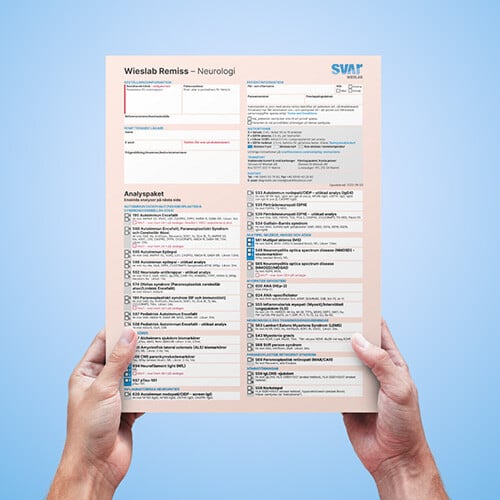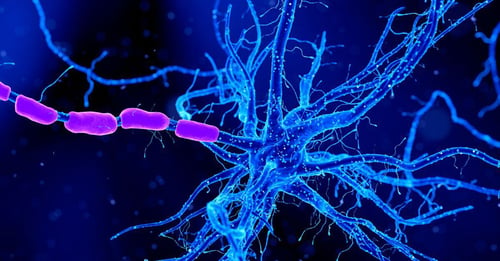
Leading the way in the diagnosis of autoimmune diseases

Leading the way in the diagnosis of autoimmune diseases
Wieslab Diagnostic Services
With over 30 years of experience in autoimmune diagnostics, our ISO15189-accredited specialist laboratory can help you reach the correct diagnosis. In collaboration with leading specialists, we have developed the most relevant test panels for a range of diseases.
Service highlights
Order our diagnostic tests using one of our request forms: Neurology, Autoimmunity, or Monitoring of Biopharmaceuticals. In addition, we can offer support for your research studies or projects.
- Over 190 diagnostic tests within neurology, autoimmunity, and drug monitoring
- ISO 15189 accreditation
- Fast turnaround time – typically within 5–7 days
- Urgent testing (24 or 48h) available for selected tests
- Free consultation from our medical specialist regarding your results
- Sample material stored in our biobank for 5 years
- Innovative app for fast and convenient test browsing

Request forms
Download request forms, sampling instructions, consent forms, and more.
Test portfolio
FILTER VIEW21-Hydroxylase Antibodies
Diagnostic test for antibodies against 21-Hydroxylase. For suspicion of Addison’s disease.
Abatacept
Diagnostic test for monitoring of abatacept levels and control of Anti-Drug Antibodies (ADA) against the drug.
Acetylcholine Receptor Antibodies
Diagnostic test for antibodies against AChR. For suspicion of Myasthenia gravis, and thymoma.
Adalimumab
Diagnostic test for monitoring of the Adalimumab level and control of Anti-Drug Antibodies (ADA) against the drug.
Adrenal Cortex Antibodies
Diagnostic test for antibodies against the adrenal cortex. For suspicion of primary Addison’s disease (idiopathic adrenal cortex ...
Agrin Antibodies
Diagnostic test for antibodies against Agrin. For suspicion of myasthenia gravis.
Alpha-Enolase Antibodies
Diagnostic test for antibodies against Alpha-Enolase. For suspicion of paraneoplastic retinopathy (Carcinoma Associated ...
Alzheimer's Disease Biomarkers
Diagnostic test panel for Tau, pTau, and Ratio Aβ42/40. For suspicion of Alzheimer's Disease.
Alzheimer's Disease Biomarkers – Extended Analysis
Diagnostic test panel for ApoE4, Neurogranin, and pTau-181. For suspicion of Alzheimer's disease.
AMPA Receptor 1/2 Antibodies (IgG)
Diagnostic test for antibodies against AMPAR 1/2. For suspicion of autoimmune encephalitis and paraneoplastic syndrome.
Amphiphysin Antibodies (IgG)
Diagnostic test for antibodies against Amphiphysin. For suspicion of paraneoplastic syndrome and autoimmune encephalitis.
Amyotrophic Lateral Sclerosis (ALS) Biomarkers
Diagnostic test panel for pNfH and NfL. For suspicion of progressive ALS (amyotrophic lateral sclerosis).
ANA (HEp-2)
Diagnostic test for ANA (HEp-2). For suspicion of collagenosis diseases, systemic lupus erythematosus (SLE), scleroderma (SSc), ...
ANA Specificities
Diagnostic test for antibodies against ANA specificities (Sm, nRNP, SSA/Ro60, SSB, Scl-70, Jo-1). Antibodies against extractable ...
ANCA Vasculitis/Anti-GBM Disease (Goodpasture Syndrome)
Diagnostic test panel for antibodies against GBM, dsDNA, PR3, and MPO. For suspicion of ANCA-associated systemic vasculitis.
ANNA-3 Antibodies
Diagnostic test for antibodies against ANNA-3. For paraneoplastic syndromes.
Antiphospholipid Syndrome (APS)
Diagnostic test panel for antibodies against Cardiolipin (IgG, IgM) and Beta-2-Glycoprotein 1 (IgG, IgM). For suspicion of ...
Antiphospholipid Syndrome (APS) – Extended Analysis
Diagnostic test panel for antibodies against Cardiolipin (IgA), Beta-2-Glycoprotein 1 (IgA), and Phosphatidylserine (IgGAM). For ...
ApoE4 Genotyping
Diagnostic test for ApoE4. For suspected Alzheimer's Disease.
Aquaporin 4 (AQP4) Antibodies (IgG) – Live CBA
Diagnostic test for antibodies against AQP4. For suspected Neuromyelitis Optica (NMO).
Aquaporin 4 (AQP4) Antibodies (IgG)
Diagnostic test for antibodies against AQP4. For suspected Neuromyelitis Optica (NMO).
Autoimmune Encephalitis
Diagnostic test panel for antibodies against AMPAR 1/2, LGI1, CASPR2, DPPX, NMDA-R, and GABA-BR. For suspicion of Autoimmune ...
Autoimmune Encephalitis, Paraneoplastic Syndrome & Cerebellar Ataxia
Diagnostic test panel for antibodies against GAD, Hu, Amphiphysin, Recoverin, SOX1, Yo, Zic4, Ri, Tr, AMPAR 1/2, Ma, LGI1, ...
Autoimmune Epilepsy
Diagnostic test panel for antibodies against GAD, AMPAR 1/2, LGI1, CASPR2, NMDA-R, and GABA-BR. For suspicion of autoimmune ...
Autoimmune Epilepsy – Extended Analysis
Diagnostic test panel for antibodies against Hu, Ma, GlyR, DPPX, CV2/CRMP5, Ganglionic AChR2, and GFAp. For suspicion of ...
Autoimmune Liver Disease
Diagnostic test panel for LKM-1, LC-1, AMA-M2, M2-3E (BPO), Sp100, PML, gp210, SLA/LP, Ro-52, and ANA (HEp-2) and antibodies ...
Autoimmune Liver Disease Screen
Diagnostic test for LKM-1, LC-1, AMA-M2, M2-3E (BPO), Sp100, PML, gp210, SLA/LP, and Ro-52. For suspicion of autoimmune liver ...
Autoimmune Nodopathy/CIDP – Extended Analysis with Reflex (IgG1-4)
Diagnostic test panel for antibodies against NF155, NF186, CNTN1, and CASPR1. For suspicion of inflammatory Neuropathy/Autoimmune ...
Autoimmune Nodopathy/CIDP – Screen IgG
Diagnostic test for antibodies against NF155 (IgG), NF186 (IgG), CNTN1 (IgG), and CASPR1 (IgG). For suspicion of Inflammatory ...
Autoimmune nodopathy/CIDP – subclass screen (IgG1-4)
Diagnostic test panel for antibodies against NF155 (IgG1-4), NF186 (IgG1-4), and CNTN1/CASPR1 (IgG1-4). For suspicion of ...
Autoimmune Pancreatitis Type 2 (AIP2)
Diagnostic test panel for antibodies against carbonic anhydrase II and Lactoferrin (DNA-bound, IgG). For suspicion of Autoimmune ...
Beta Amyloid Ratio 42/40
Diagnostic test for Ratio Aβ42/40. For memory investigation, Alzheimer's disease.
Beta-2-Glycoprotein 1 Antibodies (IgG, IgM)
Diagnostic test for antibodies against Beta-2-Glycoprotein 1 (IgG, IgM). For suspected primary antiphospholipid syndrome (APS) ...
Beta-2-Glycoprotein Antibodies (IgA)
Diagnostic test for antibodies against Beta-2-Glycoprotein 1 (IgA). For suspicion of antiphospholipid syndrome (APS).
Beta-Amyloid 42
Diagnostic test for Aβ42. For Alzheimer's disease and memory examination.
BPI-ANCA (IgG, IgA)
Diagnostic test for BPI-ANCA (IgG, IgA). For the assessment of the prognosis of cystic fibrosis.
Bullous Dermatosis
Diagnostic test panel for antibodies against Envoplakin (IgG), Collagen VII (IgG), BP180 (IgG), BP230 (IgG), and Desmoglein 1 & 3 ...
Bullous Pemphigoid (BP180/BP230) Antibodies (IgG)
Diagnostic test for antibodies against BP180 (IgG) and BP230 (IgG). For suspicion of autoimmune skin diseases such as pemphigoid ...
C-/P-ANCA
Diagnostic test for suspicion of systemic vasculitis and inflammatory diseases.
C1 INH Function
Diagnostic test for C1 INH function. For investigation of angioedema.
C1 INH Level
Diagnostic test for C1-INH level. For investigation of angioedema.
C1q
Diagnostic test for C1q. For investigation of inflammatory system disorders, glomerulonephritis and recurrent urticaria or ...
C1q Antibodies
Diagnostic test for antibodies against C1q. For suspected Hypocomplementemic urticarial vasculitis syndrome or SLE with renal ...
C3
Diagnostic test for C3. For suspicion of complement activation or other deviations within the complement system.
C3d
Diagnostic test for C3d. For investigation of inflammatory system disorders, glomerulonephritis and other conditions in which ...
C4
Diagnostic test for C4. For suspicion of complement activation or other deviations within the complement system.
Carbonic Anhydrase II Antibodies
Diagnostic test for antibodies against carbonic anhydrase II. Suspicion of Autoimmune Pancreatitis (type 2, AIP2).
Cardiolipin Antibodies (IgA)
Diagnostic test for antibodies against Cardiolipin (IgA). If suspicion of antiphospholipid syndrome (APS) remains despite ...
Cardiolipin Antibodies (IgG, IgM)
Diagnostic test for antibodies against Cardiolipin (IgG, IgM). For suspicion of primary antiphospholipid syndrome (APS) and ...
CARP VIII Antibodies (IgG)
Diagnostic test for antibodies against CARP VIII. For suspicion of paraneoplastic cerebellar degeneration (PCD) associated with ...
CASPR1 Antibodies (IgG)
Diagnostic test for antibodies against CASPR1. For suspicion of Autoimmune nodopathy/chronic Inflammatory Demyelinating ...
CASPR2 Antibodies (IgG)
Diagnostic test for antibodies against CASPR2. For suspicion of autoimmune encephalitis and Morvan’s Syndrome.
Certolizumab
Diagnostic test for monitoring of Certolizumab levels.
cN-1A (Mup44) Antibodies (IgG)
Diagnostic test for antibodies against cN-1A. For suspicion of inclusion body myositis (IBM).
CNS Tissue Damage Biomarker
Diagnostic test panel for Tau, NfL, and GFAp. CNS tissue damage biomarkers.
Collagen Type VII IgG Antibodies (IgG)
Diagnostic test for antibodies against Collagen VII (IgG). For suspicion of autoimmune skin disease, such as pemphigoid and ...
Complement Activation
Diagnostic test panel for Complement function (classical, alternative, lectin), C3, C4, C3d, C1q. For Complement system ...
Complement Deficiency
Diagnostic test panel for Complement function (classical, alternative, lectin), C3, C4, C3d, Properdin, C1q. For suspicion of ...
Complement Function
Diagnostic test for Complement function (classical, alternative, lectin). For suspicion of complement deficiency and complement ...
CV2/CRMP5 Antibodies (IgG)
Diagnostic test for antibodies against CV2/CRMP5. For suspicion of paraneoplastic syndrome and autoimmune encephalitis.
CXCL13
Diagnostic test for CXCL13. For suspicion of neuroinflammation.
Desmoglein 1 and 3 Antibodies (IgG)
Diagnostic test for antibodies against Desmoglein 1 & 3 (IgG). For suspicion of autoimmune skin disease, e.g., pemphigus, and ...
Diabetes Mellitus Type 1
Diagnostic test panel for antibodies against GAD, islet cells, insulin, IA-2, and ZnT8. For suspicion of type 1 dependent ...
Dopamin-2 Receptor Antibodies (IgG)
Diagnostic test for antibodies against D2R. For suspicion of autoimmune encephalitis.
DPPX Antibodies (IgG)
Diagnostic test for antibodies against DPPX. For suspicion of autoimmune encephalitis.
Drug Induced Lupus
Diagnostic test panel for ANA (HEp-2) and antibodies against histones. For suspicion of drug-induced lupus or vasculitis.
dsDNA Antibodies (IgG)
Diagnostic test for antibodies against dsDNA. For suspicion of systemic lupus erythematosus (SLE) or incipient exacerbation of ...
Eculizumab
Diagnostic test for monitoring of eculizumab levels and control of Anti-Drug Antibodies (ADA) against the drug.
Endomysial Antibodies (IgA)
Diagnostic test for suspicion of celiac disease (CD) or dermatitis herpetiformis.
Envoplakin Antibodies (IgG)
Diagnostic test for antibodies against Envoplakin (IgG). For suspicion of paraneoplastic pemphigus (PNP).
Erythropoietin
Diagnostic test for anti-Erythropoietin (EPO) antibodies.
Etanercept
Diagnostic test for monitoring of Etanercept levels.
FGFR3 Antibodies (IgG)
Diagnostic test for antibodies against FGFR3. For suspicion of inflammatory sensory neuropathy.
Fibrillarin Antibodies
Diagnostic test for antibodies against fibrillarin. For suspicion of scleroderma.
GABA A Receptor Antibodies (IgG)
Diagnostic test for antibodies against GABA-AR. For suspicion of autoimmune encephalitis.
GABA B Receptor Antibodies (IgG)
Diagnostic test for antibodies against GABA-BR. For suspicion of autoimmune encephalitis and paraneoplastic syndrome.
GAD Antibodies
Diagnostic test for antibodies against GAD. For suspicion of type 1 diabetes (T1D) and Stiff Person Syndrome, Autoimmune ...
Ganglionic AChR Antibodies
Diagnostic test for antibodies against Ganglionic AChR2. For suspected autoimmune autonomic neuropathies.
Ganglioside Antibodies (IgG, IgM)
Diagnostic test for antibodies against gangliosides (GM1, GT1a, GD1a, GD1b, GQ1b, IgG+IgM). For suspicion of Inflammatory ...
GBM Antibodies (IgG)
Diagnostic test for antibodies against GBM. For suspicion of Goodpasture syndrome.
GBM Antibodies (IgG4)
Diagnostic test for antibodies against GBM (IgG4). For suspicion of Goodpasture’s syndrome, GPA, and other reno-pulmonary ...
GFAp Antibodies (IgG)
Diagnostic test for antibodies against GFAp. For suspicion of autoimmune CNS diseases.
Glial Fibrillary Acidic Protein (GFAP)
Diagnostic test for GFAP. For suspicion of CNS damage
Glomerulonephritis – Extended Analysis
Diagnostic test panel for ANA (HEp-2) and antibodies against GBM, dsDNA, THSD7A, Streptolysin O, PLA2R, PR3, MPO. For renal ...
Glycine Receptor Antibodies (IgG)
Diagnostic test for antibodies against GlyR. For suspected Stiff person syndrome and especially PERM (Progressive ...
Golimumab
Diagnostic test for monitoring of the Golimumab level and control of Anti-Drug Antibodies (ADA) against the drug.
Guillain-Barré Syndrome/AIDP
Diagnostic test panel for antibodies against MAG, Sulfatide IgM, and gangliosides (GM1, GT1a, GD1a, GD1b, GQ1b, IgG+IgM). For ...
Hereditary Angioedema (HAE)
Diagnostic test panel for C4, C1-INH level, and C1 INH function. For investigation of angioedema and chronic urticaria.
Histone Antibodies
Diagnostic test for antibodies against histones. For suspicion of drug-induced lupus syndrome.
HLA-DQB1*06:02 (Narcolepsy)
Diagnostic test for HLA-DQB1*06:02. For suspicion of narcolepsy.
HMGCR Antibodies
Diagnostic test for antibodies against HMGCR. For suspicion of immune-mediated necrotizing myopathy (IMNM).
HOMER3 Antibodies (IgG)
Diagnostic test for antibodies against HOMER3. For suspicion of autoimmune encephalitis/autoimmune cerebellar ataxia.
HSP-70 Antibodies
Diagnostic test for antibodies against HSP-70. For suspicion of autoimmune hearing loss.
Hu (ANNA-1) Antibodies (IgG)
Diagnostic test for antibodies against Hu. For suspicion of paraneoplastic syndrome.
IA-2 Antibodies
Diagnostic test for antibodies against IA-2. For suspicion of risk of developing type 1 diabetes (T1D).
IgLON5 Antibodies (IgG)
Diagnostic test for antibodies against IgLON5. For suspicion of autoimmune encephalitis.
Inflammatory Myopathies (Myositis)/Interstitial Lung Disease (ILD)
Diagnostic test panel for antibodies against cN-1A, HMGCR, Mi-2α, Mi-2β, TIF1γ, MDA5, NXP2, SAE1, Ku, PM-Scl100, PM-Scl75, Jo-1, ...
Infliximab
Diagnostic test for monitoring of the Infliximab level and control of Anti-Drug Antibodies (ADA) against the drug.
Insulin Antibodies
Diagnostic test for antibodies against insulin. For suspicion of type 1 diabetes (T1D).
Islet Cell Antibodies
Diagnostic test for antibodies against islet cells. For suspicion of risk of developing type 1 diabetes (T1D).
ITPR1 Antibodies (IgG)
Diagnostic test for antibodies against ITPR1. For suspicion of autoimmune encephalitis /autoimmune cerebellar ataxia.
KCNA2 antibodies (IgG)
Diagnostic test for antibodies against KCNA2. For suspected Autoimmune encephalitis or Atypical dementia.
KLHL11 Antibodies (IgG)
Diagnostic test for antibodies against KLHL11. For suspicion of paraneoplastic cerebellar encephalitis.
Lactoferrin (DNA-Bound) Antibodies (IgG)
Diagnostic test for antibodies against Lactoferrin (DNA-bound, IgG). For suspicion of ulcerative colitis and primary sclerosing ...
Lambert Eatons Myastena Syndrome (LEMS)
Diagnostic test panel for antibodies against AChR, GAD, Hu, Amphiphysin, SOX1, Ri, and VGCC. For suspicion of Lambert Eaton ...
LGI-1 Antibodies (IgG)
Diagnostic test for antibodies against LGI1. For suspicion of autoimmune encephalitis.
Lrp4 Antibodies
Diagnostic test for antibodies against Lrp4. For suspected Myasthenia gravis.
Ma (Ma-2/Ta) Antibodies (IgG)
Diagnostic test for antibodies against Ma. For suspicion of paraneoplastic syndrome.
MAG Antibodies
Diagnostic test for antibodies against MAG. For suspicion of Inflammatory neuropathy.
mGluR1 Antibodies (IgG)
Diagnostic test for antibodies against mGlur1. For suspicion of autoimmune encephalitis/autoimmune cerebellar ataxia.
mGluR5 Antibodies (IgG)
Diagnostic test for antibodies against mGlur5. For suspicion of autoimmune encephalitis.
Mitochondrial Antibodies (AMA)
Diagnostic test for antibodies against mitochondria (AMA). For suspicion of primary biliary cholangitis (PBC) or autoimmune ...
MOG Antibodies (IgG) – Live CBA
Diagnostic test for antibodies against MOG. For suspicion of MOG-associated disease (MOGAD).
MOG Antibodies (IgG)
Diagnostic test for antibodies against MOG. For suspicion of MOG-associated disease (MOGAD).
MPO-ANCA (IgG)
Diagnostic test for antibodies against MPO. For suspicion of systemic vasculitis, especially with kidney involvement.
Multiple Sclerosis (MS)
Diagnostic test panel for NfL, GFAp, and antibodies against AQP4 and MOG. For suspicion of multiple sclerosis.
MuSK Antibodies (IgG)
Diagnostic test for antibodies against MuSK. For suspicion of myasthenia gravis.
Myasthenia Gravis
Diagnostic test panel for antibodies against AChR, Lrp4, MuSK, and Titin. For suspicion of myasthenia gravis or thymoma.
Myositis/ Interstitial Lung Disease (ILD) Screen
Diagnostic test for antibodies against Mi-2α, Mi-2β, TIF1γ, MDA5, NXP2, SAE1, Ku, PM-Scl100, PM-Scl75, Jo-1, SRP, PL-7, PL-12, ...
Narcolepsy
Diagnostic test panel for HLA-DQB1*06:02 and hypocretin/orexin. For suspicion of Narcolepsy.
Natalizumab
Diagnostic test for monitoring of Natalizumab levels and control of Anti-Drug Antibodies (ADA) against the drug.
Neurexin-3 Alpha Antibodies (IgG)
Diagnostic test for antibodies against Neurexin-3α. For suspicion of autoimmune encephalitis.
Neurochondrin Antibodies (IgG)
Diagnostic test for antibodies against Neurochondrin. For suspicion of autoimmune cerebellar ataxia.
Neurofilament Heavy Chain (pNfH)
Diagnostic test for pNfH. For suspicion of progressive ALS (amyotrophic lateral sclerosis).
Neurofilament Light (NfL)
Diagnostic test for NfL. For suspicion of neuronal damage in the CNS or PNS.
Neurogranin
Diagnostic test for Neurogranin. For Alzheimer's disease, memory examination.
Neuromyelitis Optica Spectrum Disorder (NMOSD)/MOGAD
Diagnostic test panel for antibodies against AQP4 and MOG. For suspicion of multiple sclerosis (MS), Neuromyelitis optica ...
Neuromyelitis Optica Spectrum Disorder (NMOSD)/MOGAD – Live CBA
Diagnostic test panel for antibodies against AQP4 and MOG. For suspicion of Neuromyelitis optica spectrum disorder (NMOSD)/ MOGAD
Neuromyelitis Optica Spectrum Disorder – Tissue Damage Biomarkers
Diagnostic test panel for NfL, and GFAp. For suspicion of multiple sclerosis (MS), Neuromyelitis optica spectrum disorder (NMOSD) ...
Neuronal Antibodies – Extended Analysis
Diagnostic test panel for antibodies against GlyR, VGCC, IgLON5, CARP VIII, HOMER3, ITPR1, Neurexin-3α, ANNA-3, PCA 2, and GFAp. ...
NMDA Receptor Antibodies (IgG)
Diagnostic test for antibodies against NMDA-R. For suspicion of autoimmune encephalitis.
Ophelia’s Syndrome (Paraneoplastic Cerebellar Ataxia or Limbic Encephalitis)
Diagnostic test panel for antibodies against mGlur1, mGlur5. For suspicion of Ophelia's Syndrome.
Orexin (Hypokretin-1)
Diagnostic test for hypocretin/orexin. For suspected narcolepsy.
Paraneoplastic Retinopathy Syndrome (MAR/CAR)
Diagnostic test panel for antibodies against Recoverin and Alpha-Enolase. For suspicion of paraneoplastic retinopathy (MAR/CAR).
Paraneoplastic Syndrome (IIF and Immunoblot)
Diagnostic test panel for antibodies against GAD, Hu, Amphiphysin, Recoverin, SOX1, Yo, Zic4, Ri, Tr, Ma, CV2/CRMP5, and Titin. ...
Parietal Cell Antibodies
Diagnostic test for antibodies against parietal cells. For suspicion of pernicious anemia and atrophic gastritis.
PCA-2 Antibodies
Diagnostic test for antibodies against PCA 2. For suspicion of paraneoplastic syndrome.
Pediatric Autoimmune Encephalitis
Diagnostic test panel for antibodies against GAD, NMDA-R, GABA-AR, GABA-BR, and MOG. For suspicion of Pediatric Autoimmune ...
Pediatric Autoimmune Encephalitis – Extended Analysis
Diagnostic test panel for antibodies against mGlur5, GlyR, and D2R. For suspicion of Pediatric Autoimmune Encephalitis.
Phosphatidylserine Antibodies (IgA)
Diagnostic test for antibodies against Phosphatidylserine (IgA). For suspicion of antiphospholipid syndrome (APS).
Phosphatidylserine Antibodies (IgG)
Diagnostic test for antibodies against Phosphatidylserine (IgG). For suspicion of antiphospholipid syndrome (APS).
Phosphatidylserine Antibodies (IgGAM)
Diagnostic test for antibodies against Phosphatidylserine (IgGAM). For suspicion of antiphospholipid syndrome (APS).
Phosphatidylserine Antibodies (IgM)
Diagnostic test for antibodies against Phosphatidylserine (IgM). For suspicion of antiphospholipid syndrome (APS).
PLA2R Antibodies ELISA (IgG)
Diagnostic test for antibodies against PLA2R. For suspicion of primary membranous nephropathy (PMN).
PLA2R Antibodies IIF (IgG)
Diagnostic test for antibodies against PLA2R. For suspicion of primary membranous nephropathy (PMN).
Plexin D1 Antibodies (IgG)
Diagnostic test for antibodies against Plexin D1. For suspicion of small fiber neuropathy.
PM/Scl (100kD) Antibodies
Diagnostic test for antibodies against PM/Scl. For suspicion of polymyositis/scleroderma overlap syndrome, scleroderma, and ...
PR3-ANCA (IgG)
Diagnostic test for antibodies against PR3. For suspicion of systemic vasculitis and follow-up of patients with vasculitis.
Primary Membranous Nephropathy (PMN)
Diagnostic test panel for antibodies against THSD7A and PLA2R. For suspicion of primary membranous nephropathy (PMN).
Properdin
Diagnostic test for Properdin. For the investigation of complement deficiency.
pTau
Diagnostic test for pTau. For Alzheimer's disease and memory examination.
pTau-181
Diagnostic test for pTau-181. For suspicion of Alzheimer's disease.
Recoverin Antibodies (IgG)
Diagnostic test for antibodies against Recoverin. For suspicion of paraneoplastic retinopathy (Carcinoma Associated Retinopathy, ...
Ri (Nova 1/ ANNA-2) Antibodies (IgG)
Diagnostic test for antibodies against Ri. For suspicion of paraneoplastic syndrome.
Ribosomal P-Protein (Ribo-P) Antibodies
Diagnostic test for suspicion of systemic lupus erythematosus, especially with CNS involvement.
Rituximab
Diagnostic test for monitoring of rituximab levels and control of Anti-Drug Antibodies (ADA) against the drug.
RNA Polymerase Antibodies
Diagnostic test for antibodies against RNA polymerase. For suspicion of scleroderma.
Ryanodin Receptor 1 (RyR1) Antibodies
Diagnostic test for suspected thymoma and myopathy.
Sez6L2 Antibodies (IgG)
Diagnostic test for antibodies against SEZ6L2. For suspicion of autoimmune encephalitis.
Sm Antibodies
Diagnostic test for suspicion of systemic lupus erythematosus.
Small Fiber Neuropathy (SFN)
Diagnostic test panel for antibodies against FGFR3, TS-HDS, and Plexin D1. For small fiber neuropathy and suspicion of ...
Small Fiber Neuropathy (SFN) – Extended Analysis
Diagnostic test panel for antibodies against SSA, SSB, TG2, CASPR2, CV2/CRMP5, and PCA 2. For Suspicion of Small Fiber Neuropathy ...
Smooth Muscle Antibodies (SMA)
Diagnostic test for antibodies against smooth muscle (SMA). For suspicion of autoimmune hepatitis (AIH) type 1.
SOX1 Antibodies (IgG)
Diagnostic test for antibodies against SOX1. For suspicion of paraneoplastic syndrome.
SSA/Ro52 Antibodies
Diagnostic test for antibodies against SSA/Ro52. For suspicion of autoimmune disease and congenital AV-block/cardiac arrhythmia ...
SSA/Ro60 Antibodies
Diagnostic test for antibodies against SSA. For suspicion of Sjögren's syndrome and systemic lupus erythematosus.
SSB/La Antibodies
Diagnostic test for antibodies against SSB. For suspicion of Sjogren's syndrome and systemic lupus erythematosus.
Stiff Person Syndrome
Diagnostic test panel for antibodies against GAD, Amphiphysin, and GlyR. For suspicion of Stiff Person Syndrome.
Streptolysin O Antibodies
Diagnostic test for antibodies against Streptolysin O. For suspicion of glomerulonephritis.
Striational Antibodies
Diagnostic test for antibodies against striated muscle. For suspicion of myasthenia gravis, and thymoma.
Sudden Deafness
Diagnostic test panel for antibodies against HSP-70 and PR3. For suspicion of an autoimmune cause of sudden hearing loss.
Sulfatide Antibodies (IgM)
Diagnostic test for antibodies against Sulfatide IgM. For suspicion of inflammatory polyneuropathy.
Systemic Inflammatory Disease
Diagnostic test panel for ANA (HEp-2) and antibodies against ANA specificities (Sm, nRNP, SSA/Ro60, SSB, Scl-70, Jo-1), ...
Systemic Lupus Erythematosus (SLE)/Sjogren's Syndrome
Diagnostic test panel for ANA (HEp-2) and antibodies against dsDNA, ANA specificities (Sm, nRNP, SSA/Ro60, SSB, Scl-70, Jo-1), ...
Systemic Sclerosis/Scleroderma
Diagnostic test panel for ANA (HEp-2) and antibodies against ANA specificities (Sm, nRNP, SSA/Ro60, SSB, Scl-70, Jo-1). For ...
Systemic Sclerosis/Scleroderma – Extended Analysis
Diagnostic test panel for antibodies against RNA polymerase, fibrillarin, PM/Scl, and Th/To. For suspicion of Systemic ...
Tau
Diagnostic test for Tau. For Alzheimer's disease, memory examination, and CNS injury.
Th/To Antibodies
Diagnostic test for antibodies against Th/To. For suspicion of scleroderma.
THSD7A Antibodies (IgG)
Diagnostic test for antibodies against THSD7A. For suspicion of primary membranous nephropathy (PMN).
Titin Antibodies (IgG)
Diagnostic test for antibodies against Titin. For suspicion of Myasthenia Gravis or paraneoplastic syndrome.
Tocilizumab
Diagnostic test for monitoring of tocilizumab levels and control of Anti-Drug Antibodies (ADA) against the drug.
Tr Antibodies (IgG)
Diagnostic test for antibodies against Tr. For suspicion of paraneoplastic syndrome.
Transglutaminase Antibodies (IgA)
Diagnostic test for antibodies against TG2. For suspicion of small fiber neuropathy.
Trib2 Antibodies
Diagnostic test for antibodies against Trib2. For suspicion of narcolepsy.
TS-HDS Antibodies (IgM)
Diagnostic test for antibodies against TS-HDS. For suspicion of small fiber neuropathy.
Ustekinumab
Diagnostic test for monitoring of Ustekinumab levels and control of Anti-Drug Antibodies (ADA) against the drug.
Vedolizumab
Diagnostic test for monitoring of Vedolizumab levels and control of Anti-Drug-Antibodies (ADA) against the drug.
VGCC Antibodies
Diagnostic test for antibodies against VGCC. For suspicion of paraneoplastic neuropathy, Lambert-Eaton myasthenic syndrome and ...
VGKC Antibodies (IgG)
Diagnostic test for antibodies against VGKC. For suspicion of autoimmune encephalitis and paraneoplastic symptoms.
Yo (Purkinje cell) Antibodies (IgG)
Diagnostic test for antibodies against Yo. For suspicion of paraneoplastic syndrome.
Zic4 Antibodies (IgG)
Diagnostic test for antibodies against Zic4. For suspicion of paraneoplastic syndrome.
ZnT8 Antibodies
Diagnostic test for antibodies against ZnT8. For suspicion of type 1 diabetes (T1D).
Urgent testing
Our typical turnaround time is 5–7 days. However, some tests may take longer, with lead times of up to 4 weeks.
For some tests, we offer urgent testing with results within 24 or 48 hours on weekdays from 08:00 to 16:00 CET. Our portfolio of urgent tests can be seen on our request forms or by selecting the Urgent filter in the test portfolio section above.
Urgent tests are analyzed during our regular business hours. Please call +46 40 53 76 60 to let us know when an urgent sample is on its way to the laboratory.
Monitoring of Biopharmaceuticals
We offer services for measuring drug levels and anti-drug antibodies (ADA) for a wide range of biological drugs. These metrics can be crucial for optimizing therapeutic outcomes and ensuring that patients receive tailored, effective, and safer biological therapies.
Our portfolio of biopharmaceutical monitoring can be seen on our request form or by selecting the Drug monitoring filter in the test portfolio section above.

Opening hours
We are open: Monday – Friday 08:00 – 16:00 CET
We are closed on: Apr 3, Apr 6, May 1, May 14, Jun 19, Dec 25, Dec 31.
Electronic test results
Wieslab Diagnostic Services collaborates with InfoSolutions to provide fast and secure electronic test results through LabPortalen. Using an LP Gratis account, this service is free of charge, with results saved for 90 days and up to 5 users. Other account types are also available.
How to get started:
- Contact us to get a customer code at analysis.se@svarlifescience.com
- Contact InfoSolutions at support@infosolutions.se. They will ask for additional information and send you an agreement.
If you already have an account with LabPortalen or have any other questions, please contact us at analysis.se@svarlifescience.com.

Download our app
We offer a web app that gives you quick access to request forms, tests, documentation, and more in the palm of your hand. Visit wieslab.se to access the app.
ISO15189 accreditation
Wieslab Diagnostic Services has been an accredited laboratory for over 20 years. Since 2020, we have been accredited by SWEDAC in compliance with the ISO 15189 standard: "Medical laboratories—Requirements for quality and competence."
View our accreditation certificate
See a list of accredited tests
Our policy prioritizes patient safety, ensuring that even non-accredited analyses adhere to established quality assurance routines.
Wieslab complies with EA-2/15, "EA Requirement for the Accreditation of Flexible Scopes," allowing the scope of accreditation to be continuously adjusted to internal requirements, ensuring alignment with evolving medical needs within our area of expertise.
Your trusted partner for research and projects
At Wieslab Diagnostic Services, we are committed to supporting your research or project every step of the way.
We offer a diverse range of assays applied across multiple advanced technology platforms, ensuring flexibility to accommodate studies of any size—from as few as 10 samples to thousands.
Our expertise spans a broad spectrum of areas, including:
- Diagnostic testing: Neuro-immunology, nephrology, rheumatology, and gastroenterology.
- Biomarker testing: Utilizing cutting-edge platforms such as MSD (electrochemiluminescence) and SIMOA ultra-sensitive digital immunoassays.
Clinical Advice
Wieslab Diagnostic Services offers expert advice from our Medical Responsible to clinical users of our services (via telephone or e-mail). This includes guidance in the selection of appropriate tests as well as in the interpretation of test results. The aim is to ensure the optimal use of our laboratory services and support accurate clinical decision-making and patient safety.





